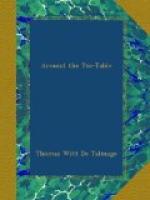Some say it was diseased eyes, some that it was a humped back. It may have been neuralgia. Perhaps it was gout, although his active habits and a sparse diet throw doubt on the supposition. Suffice to say it was a thorn—that is, it stuck him. It was sharp.
It was probably of not much account in the eyes of the world. It was not a trouble that could be compared to a lion or a boisterous sea. It was like a thorn that you may have in your hand or foot and no one know it. Thus we see that it becomes a type of those little nettlesome worries of life that exasperate the spirit.
Every one has a thorn sticking him. The housekeeper finds it in unfaithful domestics; or an inmate who keeps things disordered; or a house too small for convenience or too large to be kept cleanly. The professional man finds it in perpetual interruptions or calls for “more copy.” The Sabbath-school teacher finds it in inattentive scholars, or neighboring teachers that talk loud and make a great noise in giving a little instruction.
One man has a rheumatic joint which, when the wind is northeast, lifts the storm signal. Another a business partner who takes full half the profits, but does not help earn them. These trials are the more nettlesome because, like Paul’s thorn, they are not to be mentioned. Men get sympathy for broken bones and mashed feet, but not for the end of sharp thorns that have been broken off in the fingers.
Let us start out with the idea that we must have annoyances. It seems to take a certain number of them to keep us humble, wakeful and prayerful. To Paul the thorn was as disciplinary as the shipwreck. If it is not one thing, it is another. If the stove does not smoke, the boiler must leak. If the pen is good, the ink must be poor. If the editorial column be able, there must be a typographical blunder. If the thorn does not pierce the knee, it must take you in the back. Life must have sharp things in it. We cannot make up our robe of Christian character without pins and needles.
We want what Paul got—grace to bear these things. Without it we become cross, censorious and irascible. We get in the habit of sticking our thorns into other people’s fingers. But God helping us, we place these annoyances in the category of the “all things that work together for good.” We see how much shorter these thorns are than the spikes that struck through the palms of Christ’s hands; and remembering that he had on his head a whole crown of thorns, we take to ourselves the consolation that if we suffer with him on earth we shall be glorified with him in heaven.
But how could Paul positively rejoice in these infirmities? I answer that the school of Christ has three classes of scholars. In the first class we learn how to be stuck with thorns without losing our patience. In the second class we learn how to make the sting positively advantageous. In the third class of this school we learn how even to rejoice in being pierced and wounded, but that is the senior class; and when we get to that, we are near graduation into glory.




